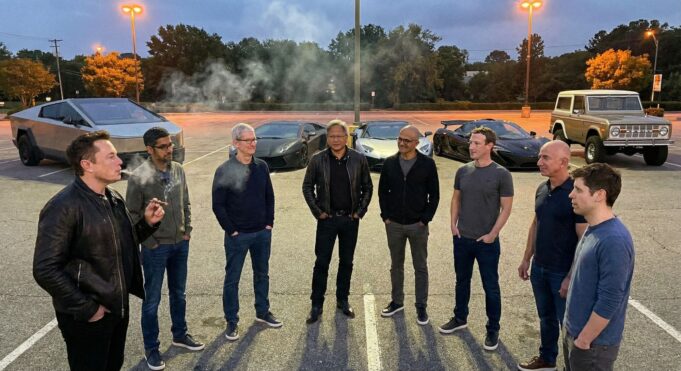OpenAI, Anthropic, and Google just got access to petabytes of proprietary data. The data is coming from 17 National Laboratories, which have been hoarding experimental data for decades.
We aren’t just talking about better chatbots anymore. The US Government’s new Genesis Mission is officially building autonomous scientific agents.
According to CNN, the executive order establishes a combined platform of supercomputers, cloud AI systems, secure datasets, robotic labs, autonomous experimentation tools, and predictive scientific models, the kind of sweeping centralization usually seen during wartime.
The Players
| Category | Partners |
|---|---|
| AI Companies | OpenAI, Anthropic, Google, xAI |
| Cloud/Compute | AWS, Microsoft, IBM, NVIDIA |
| Hardware | AMD, NVIDIA |
| Federal Labs | 17 DOE National Laboratories |
As Shacknews reports, this is a Manhattan Project-scale initiative to double US R&D productivity by pairing scientists with intelligent systems that reason, simulate, and experiment at extraordinary speed.
Closed-Loop Discovery: How It Works
They call it “closed-loop” discovery, and it fundamentally changes the physics of how we invent things. Instead of humans using tools, it will be fully autonomous.
The workflow described in the DOE roadmap is essentially sci-fi:
- The AI Designs: It looks at the data and hypothesizes: “If we mix these alloys at 4,000 degrees, we get a superconductor.”
- Robotic Execution: It sends instructions to a robotic lab (which the DOE is building) to physically mix the materials.
- Instant Feedback: The robot feeds the results back instantly. If it fails, the AI tweaks the formula.
- 24/7 Iteration: This cycle runs thousands of times a day, 24/7. No sleeping. No grant writing.
According to Argonne National Laboratory, the goal is to speed the rate of discovery by 100x to 1,000x through autonomous systems that can design experiments, execute them, and analyze results without human intervention.
Real-World Precedent: A-Lab
Berkeley Lab’s A-Lab already demonstrates this concept. The system processes 50-100 times as many samples as a human every day, operating in a closed loop where decision-making is handled without human interference.
As Oak Ridge National Laboratory’s INTERSECT initiative shows, six autonomous labs are already targeting applications from fundamental chemistry to electric grid optimization.
The Competitive Context
One commenter noted: This is the equivalent of what China has been doing and it’s why their companies have had an inexplicable edge coming out of nowhere (DeepSeek). This is what is necessary to win.
According to NBC News, former Biden administration officials acknowledge that government support for AI research builds the foundation for breakthroughs: “We take for granted that new products appear regularly but seldom consider the decades of research that made them possible.”
The Scale Advantage
OpenAI has more AI compute than all of China. It’s over bro.
But is compute alone enough? That’s where the debate gets interesting.
The Critical Counterpoint: Is This Intelligence?
One thoughtful commenter raised a fundamental challenge:
The Genesis Mission is incredible — but it still doesn’t give AI intelligence. Petabytes of data. National Labs. Autonomous robotic labs. Closed-loop scientific discovery running 24/7. That’s all amazing… but none of it creates consciousness, understanding, or meaning.
The Argument
Real intelligence, they argue, isn’t knowledge — it’s timed coherence:
- The right idea
- At the right moment
- In the right context
- Aligned with the right meaning
“You cannot get that from brute-force iteration. You cannot get that from robotic labs. Closed-loop discovery is still linear optimization, not cognition. To invent, you need resonance, not datasets.”
The Response
This critique is philosophically interesting but may be practically irrelevant. Research on “Robot Scientists” shows that autonomous systems don’t need consciousness to generate novel discoveries, they need:
- Computational models of the object of study
- Machine learning to create and test hypotheses
- Closed-loop learning that feeds results back into models
- Formalization of the scientific discovery process
As the Aspuru-Guzik group notes, these labs have already discovered new reaction routes that had never been documented— without consciousness, understanding, or “resonance.”
The Infrastructure Challenge
Another commenter asked the right question: Even if the technical infrastructure works perfectly, can bureaucracy move fast enough to make this useful? Or does it just become a $X billion pilot?
They identified the real bottleneck: “If this works, the bottleneck shifts from humans and grants to the physical side — labs, instruments, power, fiber. Agents can run 24/7, but we just need the infrastructure to make it real.”
The Genesis Mission website acknowledges this, stating goals include “building a power network that grows as fast as the technologies it fuels” and delivering materials “vital to defense and industry.”
What’s Actually Being Built
According to the executive order, within 60 days, DOE must identify 20 science and technology challenges spanning:
- Fusion Energy: Real-time collaboration between scientists, supercomputers, and AI to design and stabilize reactors
- Advanced Nuclear: New modular reactor designs optimized for safety and performance
- Materials Science: Alloys, polymers, and composites for defense and industry
- Grid Optimization: Power networks that scale with technology demand
Within 90 days, DOE must identify Federal computing resources and any additional partnerships needed to support the computational foundation.
The Anthropic Perspective
From Anthropic’s official statement:
“We’re proud to partner with @ENERGY and the Trump Administration on the Genesis Mission. By combining DOE’s unmatched scientific assets with our frontier AI capabilities, we’ll support American energy dominance as well as advance and accelerate scientific productivity.”
Whether Genesis succeeds depends not on achieving artificial general intelligence, but on three practical questions:
- Can DOE infrastructure scale fast enough?
- Can bureaucracy move at the pace of autonomous experiments?
- Can closed-loop discovery produce breakthroughs that justify the investment?
The philosophical debate about intelligence versus optimization can wait. Right now, the race is on.

